- Home
- Mark Wayne McGinnis
The Hidden Ship Page 3
The Hidden Ship Read online
Page 3
He glanced over at the nearby makeshift pen, at the huddled masses confined within it. The prisoners continued to moan, sob, and wail, as Chiv throttled closer in order to breathe in their scent. Drawing a deep breath of scented air into his lungs, he held it in until his lungs burned, then slowly exhaled. Their scent was distasteful to him but a necessary evil. He saw the despair in their eyes. “Shut up! All of you, just shut up!” he barked, exhibiting his ever-increasing annoyance with them. Suddenly lashing out in anger, he kicked the nearest human—a bald-headed elderly man. The hard heel of his boot tore open a ragged gash just above the silvery wisps of his brow. A crimson flow streaked down the wrinkled skin on the old man’s face. Chiv kicked him again for good measure, then chided himself: Stupid of me. A dead Human can’t walk to the atomizer dome. Is the reason for my annoyance related to the fact I haven’t slept in thirty-six hours? Or am I starting to feel my age?
Chiv’s earpiece squawked: “This is LT 231, arrival confirmation, sir.”
“LT vessel . . . Set your vessel down atop the northern high ridge!” Commander Chiv barked back. “Hurry! Move it along, 231!”
Chiv tracked the GravForce drive’s glowing white ring centered at the craft’s perimeter. Both its pitch and volume noise increased as the straining craft resisted the increasing pull of gravity. But Chiv had to smile. The idiot of a carrier pilot had descended way too fast—much too abruptly. He could see the troops flopping around. Tossed this way and that, like the inanimate dolls several of the humans’ small offspring held tightly clutched to their chests.
Chiv tapped at his console, bringing forth a heads-up display. He reviewed the virtual list of small town names appearing before him. His long tongue snaked out, as he wiped grit from an eye with it. He already knew he had been transferred elsewhere. Out loud, he said, “North America Sector,” then ran a clawed finger down the new list before him. He tried to pronounce several of the townships and their state names: Armonk, New York . . . Castle Rock, Colorado. They were only the first of the locations scheduled for Phase II—Extermination.
Behind the nearby chest-high mobile barricade—a transparent energy field that provided shocks whenever touched—Commander Chiv noticed a girl child staring up at him, probably no older than four or five. He briefly wondered where her parents were. Perhaps already hoofing it over to the dome, he mused in self-satisfaction. The little girl was now reaching out to him—reaching out with small, grubby, dirty hands.
Chiv had been saddled with a lazy eye since birth, it was often confusing, even disconcerting, for those in his presence—not knowing the intended direction of his true gaze. Chiv narrowed his cockeyed eyes at her. “Did you really think our takeover would be the end of it? Then what? We’d all just live peacefully here on Earth together?” He chuckled as the small child gazed up at him, clearly not understanding a word he said.
The commander waved her angrily away for distracting him. Throttling up his little scooter, he sped away without looking back.
chapter 4
During the drive back to Castle Rock, I scratched between Mort’s ears as the dog sprawled lazily across the center console, his head resting upon my lap. Unconsciously, I reached for the radio then stopped short just before my fingers reached the dial. Music was no longer broadcast over the limited airwaves, and the same went for the news. Both were deemed detrimental to the newly established, far more positive and cohesive society by the chancellor of communications. Which was, of course, total garbage. I knew for a fact, from first-hand knowledge, that Gaps liked Human music—especially country music. God, I miss the way things used to be . . .
Two years ago, the first of the strikes began; an attack that had occurred in the dead of night. I remembered waking-up to the rumblings, the familiar sound of distant exploding ordinances of war. It took me a moment to remember I wasn’t still based in southern Afghanistan. I was home in bed, where air strikes just didn’t occur. One glance at the nightstand clock told me it was three o’clock in the morning, the moment when every major city on the planet was under alien attack. An attack that was so thorough, so well instigated, that it was all over within a matter of days. A great many spacecraft dropped from the sky that night. Some were large, seemingly immobile craft—like the humongous dreadnought warships called Situational Command Ships—while others were small yet blazingly fast—the two-Gap Shredder crafts. There were thousands upon thousands of the latter. Their primary weapons included gravity-disruptor cannons that were like dropping bombs, but without the hardware or explosives. And then there were the smaller, wing-mounted plasma guns—weapons capable of precision hits on military installations and government offices. Media outlets were targeted, including most network and cable news companies, radio broadcasters, and many world newspaper headquarters. The hits were incredibly precise and ingeniously strategic. From Los Angeles, USA to Saint Petersburg, Russia, the world’s population was thrown into chaos and an information blackout.
The Human race never had a chance. These interstellar invaders traveled cosmically for a mere seven days: Seven fucking days to travel and then a few to completely humble and overtake a neighboring planet. Loss of life was relatively small, at least during their initial invasion. One hundred million souls gone in hours—most of those killed were either military or law enforcement personnel, local and national politicians, or anyone unfortunate enough to be in the wrong place at the wrong time—like those living within the larger cities, which were hit harder. Earth, it seemed, had been of studied interest to the invaders for quite some time. Apparently, faster than light, FTL, space travel is not a real possibility. But that was not to say traveling to the farthest reaches of the galaxy wasn’t possible. Not only possible but commonplace by a means our own astrophysicists would attribute to something called a Einstein-Rosen Bridge. Discovering and then procuring infinitesimal amounts of antimatter was the key—more accurately, the raw energy antimatter produces was the key. Apparently, many alien societies have mastered multi-dimensional physics. In overly simplistic terms, this is where two corresponding, fully entangled protons—even light years apart—are brought together with unimaginably high-energy manipulation of repelling quantum graviton fields. Whereby the precise folding of space-time not only can occur, but must occur, and does so with tremendous accuracy. The aliens refer to it as G-Hops, or Gravitational Hops.
Gaps, or more accurately, Earupitans, claim to be a planet’s saviors, not her invaders. Wars were now a thing of the past. No country had a surviving military. Diseases, and most illnesses, were quickly eradicated. The highly advanced aliens were Earth’s generous ‘benefactors.’ Like big brothers, they were here to keep us safe—safe from ourselves and from hostile beings in outer space. That was as far as their limited explanations went in justifying the real reasons they were here.
For a long while I had hoped they would just pack-up one day and leave—realize that Earth wasn’t all that exciting a planet to hang out on. That they’d become bored out of their lizard-friggin’ minds and depart the same way they’d come—disappearing into the dark sky in the dead of night.
But that was not to be. The Earupitans were here to stay. For the past two years, both aliens and Humans had settled into some kind of mutual acceptance. Sure, there were uprisings on Earth, quite a few in fact, especially in the U.S., where many of its private citizenry were well armed. The alien invaders, the Gaps, lost thousands of their own brethren too. Perhaps that was one aspect of the invasion they had not anticipated. But in the end, their ruthless means of dealing with troublemakers succeeded in quelling further uprisings. Gaps made it a point to know exactly who their new subjects were. Used friend against friend and family member against family member to weed-out any subversive behavior. The means of gaining information, from anyone, went well beyond using solitary confinement or waterboarding. The Gap lizards were experts in the application of pain. They’d brought its effectiveness up to a virtual art form. Ah, the
wonders of advanced technology.
It was after dark when I turned onto my own long dirt driveway. A quarter-mile later, I saw the lights in my ranch-style home—along with some in a series of smaller outbuildings—and in the large, faded red barn. The ranch had been in the Polk family for a number of generations. My parents, John and Lidia Polk, were on vacation on a cruise to the South Pacific at the time of the invasion. Most, if not all, of the large sea-going vessels were destroyed. Apparently the Gaps, not understanding the concept of pleasure cruise ships, sank all such ships thinking they were military in nature. My older brother, Glen, taken into custody a year ago for reasons still unknown to me, hasn’t been heard from since.
I veered left toward the barn and parked next to Donny’s Jeep Cherokee. Turning-off the engine, I glanced over and found my friend still sitting behind the wheel. I climbed out, quickly followed by Mort. The dog immediately ran off into the dark, undoubtedly needing to relieve his bladder. I heard Donny’s footsteps coming around the bed of my truck.
“Why didn’t you just go on inside, wait in the barn?” I asked, even though I already knew full well why.
“Ha ha . . . you’re funny,” he said.
I knew Donny was afraid to venture into the barn alone—afraid of what was inside there.
“What took you so long? I’ve been here close to an hour.”
“My meeting in Elizabeth took me longer than anticipated,” I said, lowering the truck’s tailgate. “Can you help me with this stuff?”
“Holy crap, what is all this?”
“A more sustainable means to keep our guest properly fed.”
A full moon provided just enough illumination for Donny to take in the truck bed’s assorted contents. “Explain . . .”
“Well, I figured buying bugs only one or two at a time was sure to attract more attention than we wanted—Hey, grab that end, will you?”
“Sure.”
“This here is a brand-new aluminum breeding trough,” I said.
Once Donny got a firm grip on the trough he began walking backward. Together, we got the thing out of the bed. “Let’s set it down over there, by the barn doors.”
“And what’s all this other crap?” Donny asked, now sounding intrigued.
“Municipal tap water won’t cut it. And getting real sea water, which would be optimum, isn’t realistic since the closest ocean is a thousand miles away.”
“Okay . . .”
“So in there is a circulating pump, some hoses, various cleaning tools, chemicals . . . a large container of salinated water, and a big bag of baking soda to help in maintaining the proper pH level. Breeding these bugs, I found out, is a complicated process.”
Donny threw a glance toward the barn doors. “And you got the lobsters . . . the bugs . . . to put in this trough?”
I nodded. “I bought six full-sized lobsters; they’re in the coolers there. I also bought bug larvae. Enough that this little operation should stay self-sustaining for quite a while.”
Donny shook his head. “All this for just one—”
Twin headlights coming down the driveway interrupted our conversation. We peered toward the approaching vehicle. “That doesn’t look like Matt’s Subaru,” Donny said.
“No, it doesn’t,” I agreed.
“If it’s a Gap patrol, you won’t be able to explain having this stuff.”
“Thank you, Donny, but I already know that.”
“Or what you have locked-up in that barn, either.”
I let out a relieved breath. “Looks like Matt got a ride. With his sister.”
An old Bronco braked to a stop on the far side of Donny’s Jeep. Matt and Karen climbed out, then made their way over to where Donny and I were standing by the doors into the barn. Almost a year had passed since I’d last seen Karen. The two of us had a shared history and it was good to see her again. I wondered if she felt the same. She wore skinny jeans and a tucked-in white T-shirt, its sleeves torn-off at the shoulders. Her exposed tanned arms were well-toned. Her long chestnut hair, cascading down her back, was secured in place by a loose scrunchy.
“Hey,” Matt said.
“Hey,” Donny said back.
Karen perused the trough, then looked into the bed of the truck. She finally turned to me. “Not a bad idea.”
Of course, she’d figured out what all this stuff was for. She was the smartest person I knew—a hell of a lot smarter than me.
“Thought you didn’t want any part of this,” I said.
Karen shrugged. “Maybe I still don’t, so don’t push it. I’m here, aren’t I?”
It took every bit of willpower to keep a smile off of my face.
chapter 5
I unlocked the double barn doors, slid them apart and went inside with Matt, Karen, and Donny following behind me. I relocked the doors and only then flicked on the light switch. A single light bulb came on overhead, providing little illumination into the rest of the barn. I watched Karen’s face as she took in the dim expansive space lying beyond them. One horse, and then a second one, whinnied somewhere in the distance.
“I’d forgotten. Seems even bigger on the inside than on the outside,” she said.
“One of the largest, still-standing barns in Douglas County,” I offered. “Word has it, a hundred years back my forefathers held the county’s annual livestock auction right in here . . . for three days, a few hundred local ranchers, along with all their farm animals, passed in through the barn’s rear doors. Then came all the haggling and bartering.”
Karen, both hands on hips, continued to stare into the mostly unlit darkness lying beyond the cone of light we were standing within. She crossed over to the wall and, one-by-one, flipped up the other six switches. The rest of the barn brightened beneath the big, industrial-sized, hanging lights situated high overhead. There were eight enclosed horse stalls, two of them occupied, situated along the far right wall. Tarp-covered farm equipment took up a good amount of space in the center of the barn. But Karen wasn’t looking at the stalls or farm equipment. Nor was anyone else. Ten paces to the left stood a lone figure. A structural overhead beam cast him into dark shadow. Beyond him, positioned up against the wall, lay a thin mattress atop an army cot. Next to the cot sat a metal bucket. A chain jangled, metal against metal, as the figure tried to adjust his off-kilter stance. He was unused to standing. He wore overalls that I had to special order from a big-and-tall store to fit his oversized frame.
“So . . . what? You just keep him chained up like this? Day after day?” Karen asked.
“That’s right,” I said.
“Make him piss and shit in that bucket?” she asked.
I didn’t answer.
“And he’s helping you with that?” Karen pointed to a nearby workshop area where something was covered by a large green tarp. “And no, Matt hasn’t told me exactly what you have hidden in here . . . other than the Gap prisoner.”
Keeping their distance from the chained alien, Donny and Matt strode over to the workshop. Together, they pulled the tarp away from what it covered. The metallic surface of the sleek-looking Earupitan Shredder Craft gleamed brightly beneath the overhead lights. The two-person craft was about three-quarters of the size of the F-16 Fighting Falcon, the jet I flew in that dustbowl warzone, half a world away. The alien craft’s fuselage, a mix of soft and hard edges, conveyed something both sleek and menacing at the same time. Two stubby wings angled back from the fuselage’s midsection, while the six aft curved fins—like saber swords mounted in a circular configuration—protruded outward. Everything about the craft forewarned of ominous outcomes—power and destruction unleashed: A harbinger of death. Various crevices here and there, and along structural ridgelines, glowed a soft blue. I’d visited the vessel every day for the past two years, yet even to this day it still evoked within me a sense of mystery and wonder. And I couldn’t wait to fly
the damn thing.
“We can talk about the ship later . . .” Karen said, turning back toward the tall looming Gap, standing within the shadows. Glancing over at her brother, she asked, “You gave him one of your old legs?”
Matt said. “I only wear the new composite one,” referring to his latest, state of the art, prosthetic leg. “I don’t wear that old thing anymore.”
Karen nodded. It was clear the alien was far too big for the much too small artificial appendage he now was wearing.
“It was his choice,” I said. “Either use that, or crawl around on the floor with the rats and roaches.”
“You could have given him a crutch or something instead,” Karen offered.
“Bad idea . . . a crutch could be used as a weapon,” Donny interjected.
Karen rolled her eyes.
“Look, Karen, Gaps are not like the diaper heads we once fought over back in the sand box. These aliens are fast and mean; and those massive jaws . . . those teeth, could tear off an arm or leg with no problem,” Donny said.
“Couldn’t he just use the prosthetic leg as a weapon?” she asked.
I raised a hand: “Enough about the leg. The important thing is, he’s helping me. He doesn’t complain. He doesn’t ask for anything other than having me empty his shit bucket twice a day. He’s a means to an end.”
Karen took a step closer to the alien. “Does it . . . he . . . have a name?”
I settled my gaze on the prisoner Gap. He was perfectly capable of speaking for himself.
A phlegmy-gurgled voice answered her. “In Human phonetics, my name would be Jhall Doulk Hargoth. Brian calls me Jhall . . . sometimes Jhally.”
Karen, looking somewhat bemused, said back, “Okay, then Jhally, it is. I’m new to all this.” But her expression quickly turned to that of disgust. She turned to me. “Never could stomach the thought of being in such close proximity to . . . the ones that ripped our world apart. Not to mention, stole the love of my life. You’ll have to excuse my resentment; my . . . growing hostility and anger.”

 The Hidden Ship
The Hidden Ship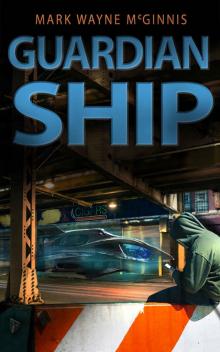 Guardian Ship
Guardian Ship Cloudwalkers
Cloudwalkers Mad Powers (Tapped In)
Mad Powers (Tapped In) Ship Wrecked
Ship Wrecked The Great Space (Scrapyard Ship Book 6)
The Great Space (Scrapyard Ship Book 6)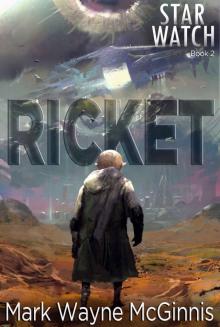 Ricket (Star Watch Book 2)
Ricket (Star Watch Book 2)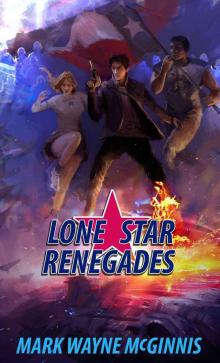 Lone Star Renegades
Lone Star Renegades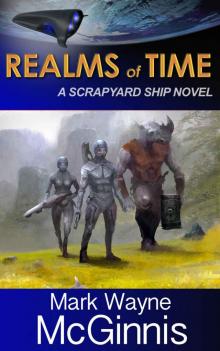 Realms of Time (Scrapyard Ship)
Realms of Time (Scrapyard Ship) Glory for Sea and Space (Star Watch Book 4)
Glory for Sea and Space (Star Watch Book 4) Scrapyard Ship 3 Space Vengeance
Scrapyard Ship 3 Space Vengeance Boy Gone
Boy Gone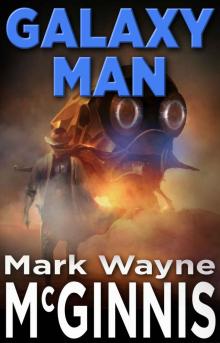 Galaxy Man
Galaxy Man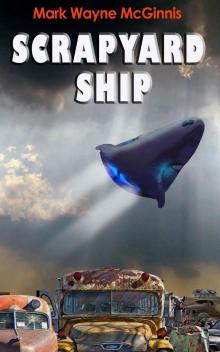 Scrapyard Ship
Scrapyard Ship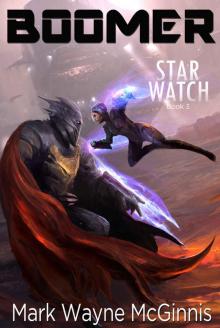 Boomer (Star Watch Book 3)
Boomer (Star Watch Book 3)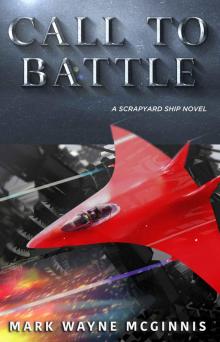 Scrapyard Ship 7: Call to Battle
Scrapyard Ship 7: Call to Battle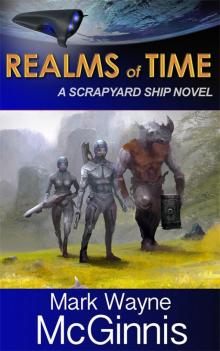 Scrapyard Ship 4 Realms of Time
Scrapyard Ship 4 Realms of Time Star Watch
Star Watch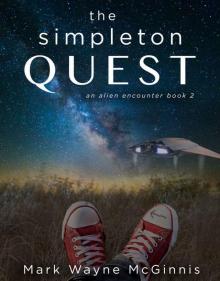 The Simpleton QUEST
The Simpleton QUEST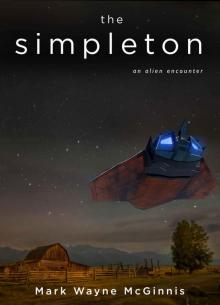 The Simpleton: An Alien Encounter
The Simpleton: An Alien Encounter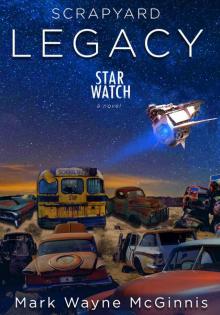 Scrapyard LEGACY (Star Watch Book 6)
Scrapyard LEGACY (Star Watch Book 6) Ship Wrecked: Stranded on an alien world
Ship Wrecked: Stranded on an alien world